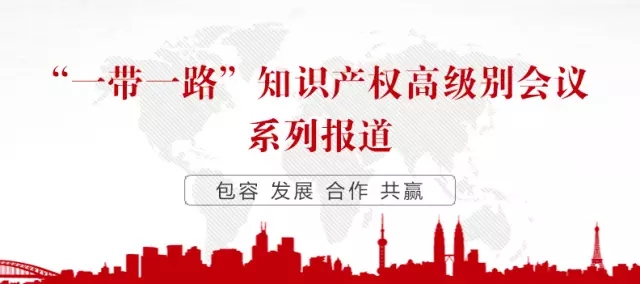

2016-07-21 国家知识产权局

New guidance document aims to promote an environment conducive to innovation,
sustainable growth
A guidance document for increasing intellectual property cooperation between countries involved in the Belt and Road Initiative is expected to be adopted at an ongoing international meeting.
"The guidance document aims to inherit and promote the tradition of the Silk Road and advance IP cooperation in the region," Shen Changyu, commissioner of the State Intellectual Property Office, told China Daily in an exclusive interview.

He was speaking prior to the High-level Conference on Intellectual Property for Countries along the Belt and Road, where the document titled "Common Initiatives for Strengthening Cooperation between Countries along the Belt and Road in the Field of Intellectual Property" is being rolled out.
The World Intellectual Property Organization and several central government departments - SIPO, the State Administration for Industry and Commerce, the National Copyright Administration and the Ministry of Commerce - along with the Beijing municipal government are co-hosting the conference in the capital from Thursday to Friday.
The document will offer suggestions for IP collaboration from such perspectives as legal systems, professional services, rights protection, public awareness, training, and information sharing and use.
"It is designed to help build an IPfriendly ecosystem in the countries involved in the Belt and Road Initiative, improve their related legal systems and thus promote an environment conducive to innovation and sustainable development," Shen said.
The Belt and Road Initiative refers to President Xi Jinping's proposals in 2013 to improve international cooperation through the construction of a Silk Road Economic Belt and 21st Century Maritime Silk Road.
"Taking into full consideration the difference in development levels, cultures, innovation capacities and legal systems, the planned statement will reflect the trends of multi-polarity, economic globalization, cultural diversity and IT-based developments," Shen said.
With about $21 trillion in economic aggregate, some 29 percent of the world's total, the countries involved in the Belt and Road Initiative, most of which are emerging economies, are encouraging innovation to promote growth.
"Their innovation will become a key growth spot in the regional and even world economy." Shen said. "As IP is playing an increasingly instrumental role in both international trade and the development of countries involved in the Belt and Road Initiative, how to integrate it into the initiative is a common issue we face."
The Chinese government has long cooperated on IP with countries along the routes. Shen said his office has signed bilateral cooperation agreements with 28 out of 65 core countries involved in the initiative. And it has developed a trilateral cooperation mechanism with its peers in Mongolia and Russia.
At the same time, SIPO has partnered with regional organizations including the Cooperation Council for the Arab States of the Gulf, the Association of Southeast Asian Nations, and the Visegrad Group, an alliance comprising four central European countries - the Czech Republic, Hungary, Poland and Slovakia.
This international cooperation covers a wide range, including patent filing processing, international training, data exchanges and documentation sharing. It has made marked progress and been widely acclaimed among the countries involved in the initiative, Shen said.
Against such a backdrop, the ongoing conference has gathered together IP leaders from 50 countries and international organizations involved in the Belt and Road Initiative, as well as representatives of the business community and the academic circle in China. They will discuss how to improve regional cooperation for "a more general preferential, inclusive, and balanced international IP system", he said.
"The event provides an effective communication channel and also helps create an IP-friendly environment for companies entering countries involved in the Belt and Road."
Government data shows that Chinese companies made direct investments worth $14.82 billion in 49 countries in the region last year, an 18.2 percent increase from 2014, accounting for 12.6 percent of total direct overseas investments by domestic investors.(by Wang Xin|China Daily)
(编辑:孙雅曼,编校:秦韵,审读:刘珊,美编:曹晨)